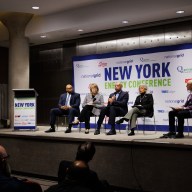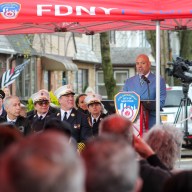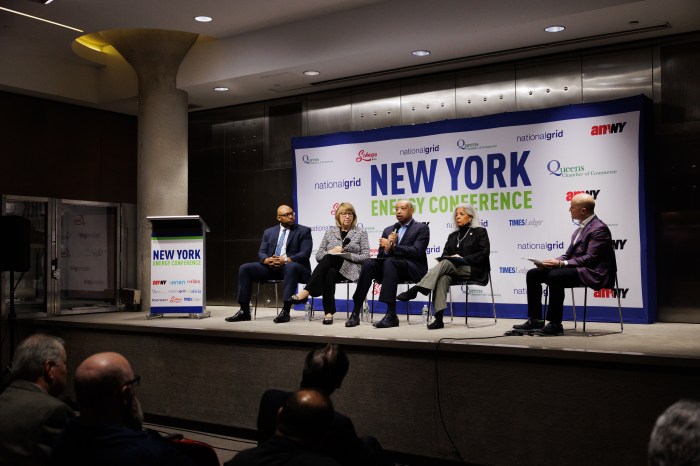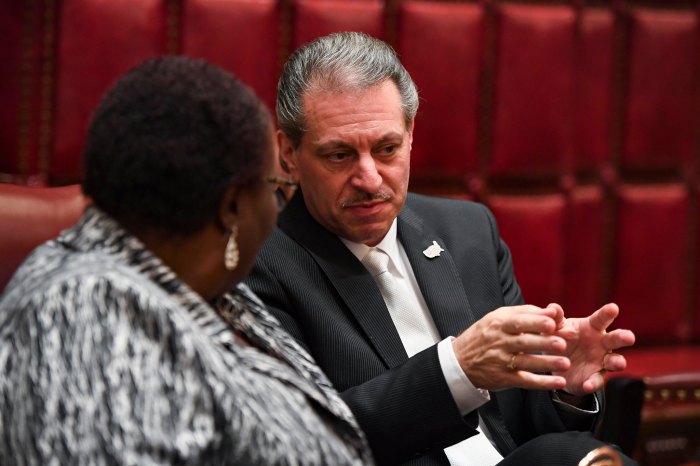By Alexander Dworkowitz
Julian Bond, the Rev. Floyd Flake and the Rev. Al Sharpton debated the challenges facing the nation’s black citizens Saturday at a symposium at St. John’s University.
Organized by the St. John’s Black Law Students Association and moderated by St. John’s professor of law Leonard Baynes, the debate was part of a one-day symposium entitled “Civil Rights in the 21st Century” at the St. John’s Law School.
The three men are among the nation’s most visible black leaders.
Bond, a native of Georgia and professor of history at the University of Virginia, fought for change as a part of two of the nation’s most prominent Civil Rights groups. He was communications director for the Student Nonviolent Coordinating Committee and is the current chairman of the NAACP.
Flake served as a Queens congressman from 1986 to 1997 before returning to Jamaica’s Allen AME Church at its pastor. Sharpton, a who has for many years jumped to the aid of victims in suspected cases of police brutality, chose to form his own group, the National Action Network based in Harlem.
Despite their varying backgrounds, the three men found themselves largely in agreement about racial issues in America.
In front of an audience of mostly St. John’s students and black professionals, the men began the discussion on the topic of segregation in housing.
While the government needs to work to fight housing discrimination, Bond said it was important to have outside organizations monitor the issue.
“You have to have a strong multilateral approach,” he said.
Flake argued that there were two sides of housing segregation. While the state often discriminated against blacks, he said blacks often chose to live in communities that tended to hurt their chances of financial success in order to stay with their own people.
Flake addressed the recent trend of suburbanites moving back to the city, gentrifying poorer areas, and forcing the poor out to the suburbs. Good examples of this trend include Harlem, Park Slope and the Lower East Side.
The Queens minister said the problem was rapidly becoming more economic in nature than racial.
“It will not be a gap that is racial, it will be a gap that is primarily economic,” he said.
Bond said cities’ attempts to attract suburbanites as part of “resettlement” policies left the poor driven out into the suburbs with the same problems that they had in the inner cities.
“The problems either follow them [to the suburbs] or grow,” he said.
Flake and Bond tied the problem of housing discrimination to the problem of education.
Bond said the policy of busing children to integrate schools had largely gone out of favor because only black children were bused to white neighborhoods, causing many of the white residents to view their presence as an invasion. If white children had been bused to black areas as well, busing would have become more of a reality to the white community and may have been more effective, Bond argued.
“People did not have the opportunity to view the integration as a reality,” he said.
The two also decried unequal funding in education, referring to the fact that suburban schools, which tend to have a larger white population, usually receive more funding that city schools, which tend to have a larger black population.
Sharpton, who arrived late, joined Bond and Flake as the discussion turned to the relationship between blacks and Hispanics, given that the recent census indicates that Hispanics have become a larger minority in both the country and New York City than blacks.
Sharpton said a strong coalition between blacks and Hispanics had already formed. He cited two events the coalition protested that sent him to jail: the 1999 police shooting of the West African immigrant Amadou Diallo in the Bronx and the U.S. Navy bombing at the Puerto Rican island of Vieques.
“Everyone who went to jail with me with Diallo went to jail in Vieques,” said Sharpton, indicating the solidarity of the two minority groups.
Turning the focus of the discussion to attitudes toward minorities during elections, Sharpton said Democratic mayoral candidate Mark Green praised him in black neighborhoods and disparaged him in white neighborhoods.
Many have said Sharpton’s tepid support of Green allowed Republican Michael Bloomberg to win after Sharpton had already thrown his support behind Green’s Democratic rival, Bronx Borough President Frenando Ferrer, who is Hispanic.
The three men said they continued to support Democratic candidates, but that no party can take the black vote for granted.
Bond spoke of the 2000 presidential election between Democrat Al Gore and Republican George W. Bush. According to Bond, the razor- thin margin of victory and the subsequent investigation into voting practices in Florida revealed that black voters were discriminated against at the polls, yet Gore refused to raise the issue.
“It was a massive attempt to keep black people from the polls,” he said. “And the Gore campaign tried to keep that on the side.”
While the men agreed that racial inequality remained an intrinsic part of American life, they also said definite progress had been made.
“This is so much better than I’ve ever seen it,” said Bond.
Reach reporter Alexander Dworkowitz by e-mail at Timesledger@aol.com or call 229-0300, Ext. 141.





























